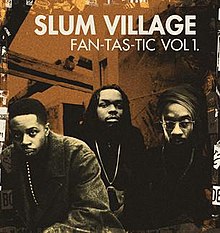Fan-Tas-Tic (Vol. 1)
| Fan-Tas-Tic (Vol. 1) | ||||
|---|---|---|---|---|
 |
||||
| Studio album by Slum Village | ||||
| Released |
|
|||
| Recorded | 1996-1997 | |||
| Genre | Hip hop | |||
| Length | 53:32 | |||
| Label | Counterflow | |||
| Producer | Jay Dee | |||
| Slum Village chronology | ||||
|
||||
| Professional ratings | |
|---|---|
| Review scores | |
| Source | Rating |
| Allmusic | |
| Pitchfork Media | 8.5/10 |
Fan-Tas-Tic (Vol. 1) (sometimes spelled as Fantastic, Vol. 1), is unofficial debut studio album by American hip hop group Slum Village. It comprises songs from their demo album, which was recorded in 1996 and 1997, but not officially released until 8 years later. It was nonetheless leaked onto the underground circuit and caused "quite a stir" in 1997. The whole album was produced by J Dilla. Many of the songs would later be revamped or re-conceived for their follow up album, Fantastic, Vol. 2 in 2000.
The album was recorded in 1996 and 1997 in J Dilla's home studio. Fan-Tas-Tic (Vol. 1) quickly became popular with fans of Detroit hip hop, when copies of the cassette were sold by the group at concerts, and also made available at Record Time on Gratiot. The record became highly sought after, with copies costing up to $50 at one point.
Although, at the time Slum Village were hailed as successors to A Tribe Called Quest, Fan-Tas-Tic shares little in common with Tribe's earthy, cerebral brand of Hip hop. The lyrical content of the album, which dealt with acquiring wealth and the attention of women, later became commonplace among mainstream hip-hop artists.
Slum Village is a contradiction, a paradox. We break rules, we do things other people wouldn't do. Places other people wouldn't go, we go there, talking about things. That's why it's really difficult to compare us to A Tribe Called Quest, because they were more tribal, peaceful type people. We're nothing like that. - Baatin
The group received much praise for their seemingly freestyled approach (which they later admitted to), and also for the production style of the then-upcoming producer Jay Dee, who subtly used low end frequencies, intricate basslines, and offbeat drums, behind the "tag-team" rhyming of his partners, T3 and Baatin.
...
Wikipedia
